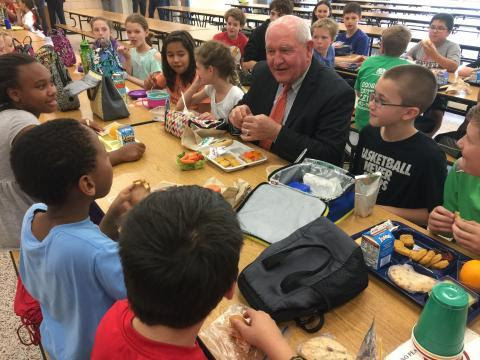
Opinion: Washington Post coverage of school meal rules unfair to potatoes
The National Potato Council has been pushing for increased inclusion of potatoes in national school breakfast and lunch guidelines in recent years, that’s no secret.
Proposed rules flexibility by the USDA and Food and Nutrition Service (FNS) that would give school foodservice operators the opportunity to use potatoes in menus more often was largely panned in a recent article by the Washington Post, however.
The Jan. 17 story’s secondary headline is “Trump administration’s USDA proposes changing school menus to allow more fries and pizza and fewer vegetables and fruits, reversing a Michelle Obama effort on her birthday.”
The rule changes, which are outlined by the USDA here, would allow schools to “offer more vegetable varieties, while keeping plenty of veggies in each meal.” In addition, fruit servings would be adjusted to make it simpler to offer meats/meat alternatives in an effort to allow more breakfast options that can be eaten outside the cafeteria.
Laura Reiley, who covers the business of food for the Post, quotes Colin Schwartz, deputy director of legislative affairs for watchdog nonprofit organization Center for Science in the Public Interest, who said the new rules license schools to “sell more pizza, burgers and fries to students.”
“(Schwartz) says limiting the variety of vegetables could make french fries even more central to students’ diets. He says that the potato lobby has been pushing for this change, and that the potato industry was behind a change that happened (in March 2018) making it easier to substitute potatoes for some fruit in weekly breakfast menus,” Reiley wrote.
The Post quoted National Potato Council (NPC) CEO Kam Quarles in its article.
“Potatoes are a nutrient-dense vegetable, which contains more potassium than a banana and 30% of the daily value of vitamin C along with three grams of protein, fiber and carbohydrates that schoolchildren need to perform their best at school,” Quarles stated.
The NPC offered further comments to Spudman, noting that a 2011 survey conducted by MMS Education (and paid for by the NPC) of school foodservice professionals indicated that 89% did not have fryers in their kitchens.
“Local food service professionals have creatively identified methods to serve potatoes that meet the standards established in the program. … Cooking and preparation techniques may impact its nutritional value — but the end product remains a healthy, nutrient-packed food, especially compared to other vegetables,” the NPC stated.
Quarles said the “change” Schwartz noted of adding potatoes as an option to school breakfasts was about official language and added serving potatoes at breakfast was already in practice.
“USDA is simply codifying in regulation the practice that has been occurring for several years now,” Quarles told Spudman. “This practice began after a bipartisan group of Congress (members) agreed that potatoes should have equivalent access to the school breakfast program that other vegetables have. Not more, just equal.”
Jumping to the conclusion that more access to potatoes means more fries is on par with more access to apples meaning more apple pie. It assumes school foodservice professionals will automatically gravitate toward fattening, sugary or sodium-infused options if given the choice.
The potato is one of the most versatile vegetables — yes, it is a vegetable — and can be prepared and served in countless ways, not just as fries.
Potatoes USA has worked tirelessly to educate consumers on the health benefits of potatoes. Efforts include highlighting athletic performance benefits and coming up with new and creative ways to use potatoes and sharing them with foodservice operators.
Unfortunately, the misconception of potatoes being unhealthy reared its head again in the Post article, which seems to be as much about partisan political squabbles as giving schoolchildren access to healthy food.
— Zeke Jennings is the managing editor of Spudman magazine. He can be reached at [email protected].
Photo: Secretary of Agriculture Sonny Perdue eats lunch with students at Catoctin Elementary School in 2017.







